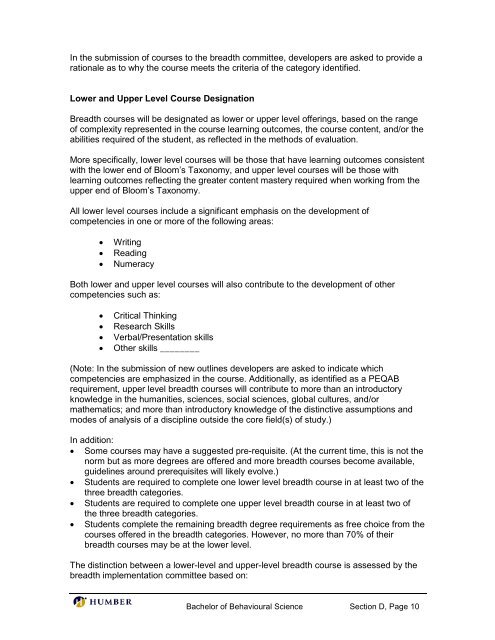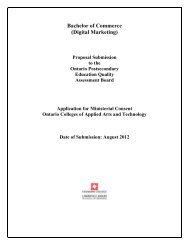Bachelor of Behavioural Science - Postsecondary Education Quality ...
Bachelor of Behavioural Science - Postsecondary Education Quality ...
Bachelor of Behavioural Science - Postsecondary Education Quality ...
You also want an ePaper? Increase the reach of your titles
YUMPU automatically turns print PDFs into web optimized ePapers that Google loves.
In the submission <strong>of</strong> courses to the breadth committee, developers are asked to provide a<br />
rationale as to why the course meets the criteria <strong>of</strong> the category identified.<br />
Lower and Upper Level Course Designation<br />
Breadth courses will be designated as lower or upper level <strong>of</strong>ferings, based on the range<br />
<strong>of</strong> complexity represented in the course learning outcomes, the course content, and/or the<br />
abilities required <strong>of</strong> the student, as reflected in the methods <strong>of</strong> evaluation.<br />
More specifically, lower level courses will be those that have learning outcomes consistent<br />
with the lower end <strong>of</strong> Bloom‘s Taxonomy, and upper level courses will be those with<br />
learning outcomes reflecting the greater content mastery required when working from the<br />
upper end <strong>of</strong> Bloom‘s Taxonomy.<br />
All lower level courses include a significant emphasis on the development <strong>of</strong><br />
competencies in one or more <strong>of</strong> the following areas:<br />
<br />
<br />
<br />
Writing<br />
Reading<br />
Numeracy<br />
Both lower and upper level courses will also contribute to the development <strong>of</strong> other<br />
competencies such as:<br />
<br />
<br />
<br />
<br />
Critical Thinking<br />
Research Skills<br />
Verbal/Presentation skills<br />
Other skills ________<br />
(Note: In the submission <strong>of</strong> new outlines developers are asked to indicate which<br />
competencies are emphasized in the course. Additionally, as identified as a PEQAB<br />
requirement, upper level breadth courses will contribute to more than an introductory<br />
knowledge in the humanities, sciences, social sciences, global cultures, and/or<br />
mathematics; and more than introductory knowledge <strong>of</strong> the distinctive assumptions and<br />
modes <strong>of</strong> analysis <strong>of</strong> a discipline outside the core field(s) <strong>of</strong> study.)<br />
In addition:<br />
Some courses may have a suggested pre-requisite. (At the current time, this is not the<br />
norm but as more degrees are <strong>of</strong>fered and more breadth courses become available,<br />
guidelines around prerequisites will likely evolve.)<br />
Students are required to complete one lower level breadth course in at least two <strong>of</strong> the<br />
three breadth categories.<br />
Students are required to complete one upper level breadth course in at least two <strong>of</strong><br />
the three breadth categories.<br />
Students complete the remaining breadth degree requirements as free choice from the<br />
courses <strong>of</strong>fered in the breadth categories. However, no more than 70% <strong>of</strong> their<br />
breadth courses may be at the lower level.<br />
The distinction between a lower-level and upper-level breadth course is assessed by the<br />
breadth implementation committee based on:<br />
<strong>Bachelor</strong> <strong>of</strong> <strong>Behavioural</strong> <strong>Science</strong> Section D, Page 10
















